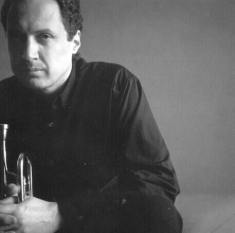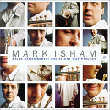
What music would you take to a remote island? It would be wise to consider taking the catalog of Mark Isham. Not only would you have a Grammy and Emmy Award winning film composer of over 50 films, there is a solo career that spans from New Age Windham Hill recordings such as 1983’s VAPOR DRAWINGS to the decidedly cool acoustic jazz of 1995’s BLUE SUN featuring Charles Lloyd. Not to mention all Isham’s recorded guest appearances. Now add to that, the often raucous MILES REMEMBERED: THE SILENT WAY PROJECT, a live album culled from some 30 hours of recorded performance.
Jerry Jazz Musician contibuting writer Attillio spoke with the classically trained trumpet and pianist from his home in L.A.
______________________
JJM: You say in the liner notes to THE SILENT WAY PROJECT how much you were influenced by Miles, yet I must admit being surprised at that. Could you talk about that for a moment.
Isham: That’s interesting you say that, because he has been the single biggest influence on me. I also realize that my recordings in the past don’t represent my real interests. I’ve played Miles’ music for years. It’s like my calling. I discovered that stuff in the sixties and seventies, but career wise, I never made records like that. I was following the wave of where music was going, but I missed that electric jazz and I found a lot of other people missed it too.
JJM: It works so well in a live situation. This sounds as if it was a fun album to make.
Isham: It was a blast to make. The good news was that we weren’t even concerned with making an album. At our gigs the tape machines were in the back and no one even knew we were recording. We even forgot we were recording. We just played and I came away with a lot of material and did a lot of editing.
JJM: Was there a tribute album to any artist that encouraged you in this pursuit?
Isham: Not really. Tribute was a word we decided to avoid. We were having our way with the music, our own sound. It wasn’t until we felt that way that I started to record the shows. I would listen to a DAT of the show and I would hear Pete (Maunu, guitarist) being a whole (Robert) Fripp influence in there. I hear Doug (Lunn, bassist) and myself bringing in a minimalist and Steve (Cardenas, guitarist) bringing in a New York- (John) Scofield kind of stuff. And, more importantly, it was becoming our own sound with a unique character of it’s own. That to me made it sound worthy of recording, worthy of release.
JJM: Now this is an odd question. Was there any advantage in getting Columbia Records interest, in the fact, that for so much of Miles’ career, he was a Columbia Artist?
Isham: That was quite interesting to me. I was recording it because I thought it was fun and I wanted to archive it. The guys in the band had a rough mix of it, as well as friends and my manager. He came back and said, “I did play this for the record company and they said, ‘This is fantastic.’ In fact, they’re releasing the box set of BITCHES BREW – they’ve got Bill Laswell and others doing remixes. They’re doing a big push on this and they’d love to release this because it aligns perfectly with what they are doing. It was in the air that people felt that this kind of music should return. And I couldn’t have been happier.
JJM: It is the most raucous album you’ve ever made
Isham: Absolutely. It is the most real in that sense, too. A real jazz record.
JJM: You’ve had such a long, successful career, was there any time when you doubted whether it would happen?
Isham: I’ve always done it because I’ve loved it. It’s funny you should have asked that, because I’ve just reaffirmed that in the last couple of days. What’s the purpose of all this? Not the money or to be famous. The purpose for me really is just to create a certain amount of beauty in the world. As long as I am doing that the frustration doesn’t enter in. You know there was a time when I actually stopped making records for awhile, after my stint with Virgin Records because I got confused about the state of instrumental music. Here was Kenny G selling billions of records, the whole instrumental music market had changed so jazz was now soft jazz and even a record company as adventuresome as Virgin was saying, “well, that’s the solution to instrumental music. And I said, “I can’t take it.” I virtually stopped making records for a couple of years.
JJM: I didn’t realize that.
Isham: And then I missed it and asked, “What is it that I love about it.” What I love about it is having a band, having that band in front of an audience and having that experience of improvising interactively with the other musicians. You know, it is putting yourself on the line in front of an audience. That’s the rush, the creative high of the whole thing. So I started a band and kept it very, very simple. Everyone was going to carry their own gear, and it would be acoustic and that is how the whole BLUE SUN project started. Because we wanted to play. Similar to THE SILENT WAY, we did some radio shows and I got the tapes back and said, “Hey, this is cool. Let’s get a record deal, I’m ready to go.”
JJM: What will you be doing in the future? You’re touring…
Isham: We seem to be getting great response. We were in Europe for a week and the East Coast for a couple weeks. I am very interested in what is happening in the whole world of electronics now. There is something going on here that is reminiscent of the late sixties, early seventies, where the genres all of a sudden got swished together and people didn’t care if you had a rock player in a jazz band or a jazz keyboard player in a rock band. You had Hendrix, Santana and Miles, Blood Sweat & Tears and Return To Forever. Who knows what genre they were in, they were just playing great music. I see a bit of that starting to happen in, not in the jazz world unfortunately, but I see it happening in this electronic dance world. They are madly sampling jazz guys, all sorts of world music and I think we could very well be on a cusp of a similar sort of renaissance we saw in the early seventies.
JJM: Are you going to throw yourself into this mix?
Isham: Well, what’s interesting is that I tried this with Virgin eight years ago and I was shut down and that is why I got discouraged for awhile. Given the success of THE SILENT WAY PROJECT, what you will see happening is this band, based on the music of Miles, will start to evolve and the rhythms will start to get much heavier and start to bring that dance element in with the interactive improvisation on top.

Miles Remembered:
The Silent Way Project
_____
Mark Isham products at Amazon.com
_______________________________
If you enjoyed this interview, you may want to read our interview with saxophonist Joshua Redman.
































